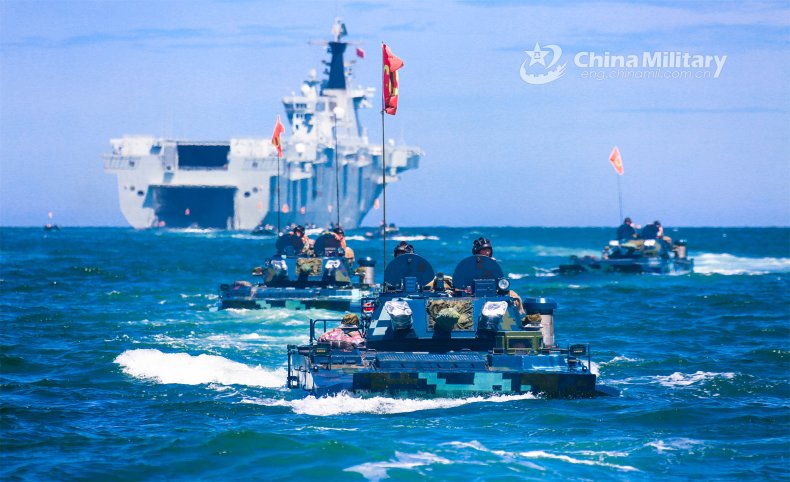The highest-ranking member of the U.S. Marine Corps has told Newsweek that his forces are lacking in a key capability that could prove critical in deterring a conflict with China or in successfully waging one should such a war erupt in the Pacific.
"The People's Republic of China is the only competitor capable of combining its economic, diplomatic, and technological power to challenge the stable and open international system that we enjoy," General David Berger, Commandant of the U.S. Marine Corps, told Newsweek.
"The ultimate goal is to prevent conflict and manage crisis in the region," he added, "and amphibious capability is critical to that goal."
Amphibious capability refers to ships tasked with carrying ground support forces such as Marine Expeditionary Units (MEU) and their vehicles across sea to land. This role is crucial in the context of the Pacific, but Berger and other senior Marines say their state of readiness has fallen to its lowest level in recent years, down to 35 percent of what was needed to mount three Amphibious Readiness Groups (ARG) at all times.
General Berger said the situation could serve as an opportunity for Beijing as it seeks to highlight its own growing capabilities.
"When available, amphibious ships allow the U.S. to 'outcompete' PRC influence by providing rapid crisis response—which includes humanitarian assistance and disaster relief—to our regional allies and partners," General Berger said. "If amphibious ships are not available, we cannot rapidly provide self-sustaining crisis response services on behalf of the U.S., and our competitors will fill that gap."
He added that the assessed shortcoming is particularly significant and could affect the performance of other U.S. military branches as, "in the case of conflict, amphibious ships enable Marines to operate as part of a wider naval campaign."

Currently, these plans are put into play as part of a three-phase rotation that first involves pre-deployment and training, then deployment and, finally, return and maintenance. This delicate balance ensures that the Marines have enough battle-ready personnel and equipment to respond in the event of a crisis.
"Any lack of availability affects that rotation," General Berger said, "which could mean that there are not ships available to maintain currency and proficiency when not deployed,"
"Also, if there was a need to surge follow-on forces to reinforce a deployed ARG/MEU," he added, "it's possible there wouldn't be ships to surge or the requisite training for the Marines and Sailors to provide the capability for the combatant commander."
This could prove to be a substantial setback should the world's two most powerful nations come to blows amid rising tensions in the Pacific, where China has amassed a rapidly growing military presence. Already capable of mobilizing the world's largest army, Chinese naval capabilities have begun to rapidly close the gap with those of the U.S., even eclipsing them in some key categories.
Among these categories is a ship-building industry that is unmatched by any other power in the world and includes an expanding amphibious fleet. The People's Liberation Army has regularly put such craft on full display in exercises demonstrating the Chinese armed forces' ability to project power to nearby islands, including politically contested Taiwan.
Over the past month alone, units of the People's Liberation Army Eastern Theater Command and Southern Theater Command have conducted such amphibious drills, with participation from the PLA Ground Force, Navy, Air Force and Marines. The PLA Rocket Force also frequently trains on how to destroy enemy assets at sea, with the Pentagon finding in its annual report last November that China conducted more missile launches throughout 2021 than every other country combined outside of actual warzones.
Marines train like we fight, and there is nothing that can prepare Marines for amphibious operations better than operating aboard amphibious ships alongside their Navy counterparts.
As for the U.S. Marines, however, their focus on these tactics, which have not been put into action at such scale since World War II, has been relatively recent.
"After two decades of land-focused wars and counterinsurgency operations, coupled with the gradual reduction of amphibious platform availability, our Marines have had less exposure to amphibious operations," General Berger said. "Although the Marine Corps is more than capable of fighting and winning right now, there is a lot to be gained from increased training and education for amphibious operations and a renewed focus on naval integration within the Department of the Navy."
"Marines train like we fight, and there is nothing that can prepare Marines for amphibious operations better than operating aboard amphibious ships alongside their Navy counterparts," he explained. "Fewer amphibious ships, naturally, detracts from the Navy and Marine Corps' ability to train as a true naval expeditionary force."
And yet, one senior U.S. Marine official told Newsweek that "amphib readiness has declined over the last decade, and ship procurement has been 'paused.'" This readiness, now at 35 percent, was as high as 55 percent in 2012 and declined to its previous lowest level of 39 percent in 2015. The 10-year average level is 46 percent.
What this means is that the U.S. Marines, at present, are unable to meet their goal of three Marine Expeditionary Unit-manned Amphibious Readiness Groups, "and haven't been in recent years due to the inconsistent readiness of our amphibs," according to the senior Marine official.
This was also General Berger's message Tuesday when he testified in front of lawmakers of the Senate Appropriations Committee.
Speaking to Newsweek following the hearing, Defense Appropriations Chair Senator Jon Tester of Montana, a Democrat, acknowledged that "the amphib issue is an important one and an expensive one."
"We will take a look at the budget. I think the budget has one in it, then we'll try to figure out how we're going to do it for this year and years coming because there has to be predictability," Tester said. "So, I get it, and it's a big issue, and it's a serious issue. But we have to live somewhat within our means, so we'll massage that through the process."

Democratic Senator Jack Reed of Rhode Island, chair of the Senate Armed Services Committee, also commented on the Marines' concerns regarding the readiness of their amphibious forces.
"I think what this is signaling is we have to look carefully at the roles and missions of the Marine Corps and provide them the appropriate number of platforms to accomplish it," Reed told Newsweek.
"But I think the Chinese are probably much more concerned about our submarines, and our air capability and all the other capabilities we bring to bear," he added.
Also speaking to Newsweek after a Wednesday hearing on Capitol Hill, General Berger argued that the U.S. still had "a much greater capability and much greater capacity" in terms of military power, but having the right number of the proper tools could give the Marines an absolute advantage in the event of a conflict.
"We're not in a deficit. We're not behind at all," General Berger said. "But like I mentioned in the hearing, we're not in favor of a fair fight. We need to make sure we have all the advantages possible and being able to operate from the sea, with everything that we bring on amphibious ships, we can pick and choose where to operate day and night."
"There's nobody on the planet that does amphibious operations anywhere close to the level the U.S. Navy and Marine Corps does," he added. "We don't want that to go down at all. We don't want that capability to go down. But there's no gap between us—we have a huge advantage."
Should this capability continue to degrade, however, he warned it could serve as an impetus for the People's Liberation Army to step up its efforts to reclaim territory it views as its own in the Pacific.
"What the Navy and the Marine Corps do with amphib ships is deter," General Berger said. "You have lower inventory, deterrence impact goes down, your ability to respond to a crisis decreases."
"We don't want to do anything to make China think 'maybe today is the day'—absolutely not," he added. "We don't want to give them that thought to need the inventory to do it."








